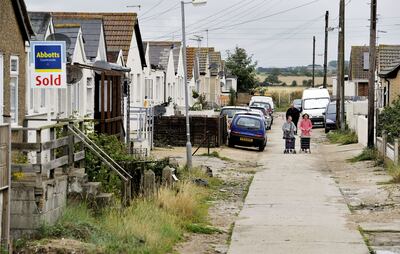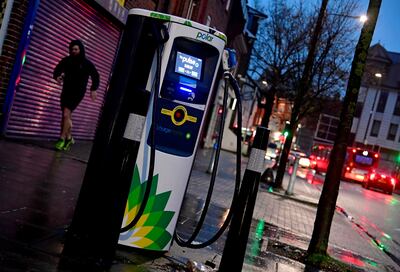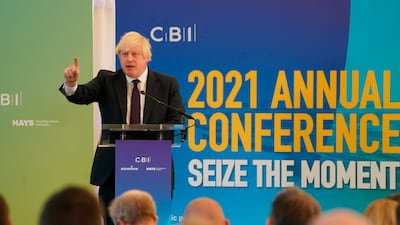Britain's Prime Minister Boris Johnson joined the leaders of the UK's top business confederation on Monday to say that carbon net zero target offers the economy its best chance of revolutionary growth in the years ahead.
Mr Johnson said the green industrial revolution was the biggest opportunity to unite and level up the UK, with government and business working in partnership to tackle the "woeful imbalance in productivity across the country".
Tony Danker, the Confederation of British Industry director-general, echoed the view from Downing Street, saying the country has “a shot at redemption” from its past mistakes if it pushes ahead and regenerates nascent industries – such as biotech, space and cybersecurity – which are emerging in all parts of the country.
Mr Johnson's call to action came at the CBI's annual conference near Newcastle as he set out plans for a dramatic expansion of the UK’s electric-vehicle charging network by 2030, when the government will ban the sale of new petrol and diesel cars.
"If this country could achieve the same geographical balance and dispersion of growth and wealth that you find in most of our most successful economic comparisons ... then there would be absolutely no stopping us and ... we can become the biggest and most successful economy in Europe," Mr Johnson said.
Just weeks after the conclusion of the Cop26 environmental summit in Glasgow, Mr Johnson laid out plans to add up to 145,000 charging points a year to the country’s electric vehicle charging system until the end of the decade.
This is an addition to the 250,000 already installed in homes and workplaces.
While Britain has one of the Europe’s largest EV charging networks, new places to charge are growing more slowly than sales of electric cars.
A new law will make it mandatory for new homes and buildings in England to have electric charging points built in.
New-build supermarkets, buildings undergoing major renovations and workplaces will also be subject to the new law.
“This is a pivotal moment – we cannot go on as we are,” Mr Johnson said. The green industrial revolution, he said, meant "fate has handed us an opportunity" to reshape the economy.
"The tipping point has come. UK sales of EVs are now increasing at 70 per cent a year and, in 2030, we are ending the market for new hydrocarbon internal combustion engine vehicles ahead of other European countries," he said.
The new charging points will absorb some of the £620 million ($833.4 million) funding set aside for the transition to electric cars that the government earmarked last month in its strategy to reach net-zero emissions.
At the CBI event, the business lobby said Mr Johnson must deliver economic growth in every part of the UK to reverse the “benign neglect” of British regions, the head of the country’s biggest business lobby group said on Monday.
Reducing London’s dominance of the UK economy and delivering economic growth across the country will be the determining factor in the success or failure of the government’s levelling-up agenda.
Mr Danker said the CBI wholeheartedly backs the government's levelling-up agenda, in a speech to a business audience at the Port of Tyne, near Newcastle, part of the business group's attempt to level up its conference by hosting it at eight locations across the country.
“Ultimately, what the UK needs to level up, however, is economic growth in every place. Growth that in turn provides better paid jobs, skilled work, firm-level success and creates the kind of virtuous circle that helps a place to prosper.“
The deindustrialisation of the UK since the 1980s has led to a regional “brain drain” as young people left for better-paid jobs in London and the south of England, where multinationals thrived, Mr Danker said.

That ambivalence about the fate of northern towns and cities left a trail of shuttered high streets and a “loss of pride in place”, he said.
“In too many sectors, the UK now feels like a branch-line economy, with the most productive parts of a sector, such as headquarters, too often based in London and the South East, and the branch managers and the back office based everywhere else,” Mr Danker said.
“We want an economy of many hubs. That means using all parts of the country to their full potential.”
He pointed to overseas investors, such as Japanese car manufacturer Nissan, which first set up in the UK in the 1980s, and announced plans to build the UK’s first car battery gigafactory that will lead to a huge expansion of its Sunderland plant in north-east England in the summer.
The £1 billion battery plant, built in partnership with Chinese battery supplier Envision, will create 900 jobs at Nissan and 750 at Envision.
But Mr Danker acknowledged that the "readjustment crunch" was a challenge for businesses as they faced rising inflation, a supply chain crisis and the threat of a resurgence in Covid-19 case numbers.
He also said that the UK cannot have another "flatlining, low-growth decade", and that now was the time to seize the moment and make "big bets" for business to get the economy back on track over the next 10 years.
Mr Danker used his speech to announce the creation of the CBI Centre for Thriving Regions to act as a vehicle for the private sector to engage in "genuine economic placemaking", with the centre staffed from all four regions of the UK.
This applies even more to net-zero, he said, "which creates a once-in-a-generation opportunity for the UK’s industrial heartlands to lead in this new industrial revolution as they did the last".
"In hydrogen. Off-shore wind. Carbon Capture. Electric vehicles and batteries, and other net-zero solutions. A chance for these places to be world-leading again. If this isn’t levelling up, I don’t know what is,” he said.

On Monday, the government also unveiled almost £10m in funding for a first-of-a-kind new hydrogen project in the UK’s largest onshore windfarm near Glasgow.
A total of £9.4m will be invested in the Whitelee green hydrogen project to develop the UK’s largest electrolyser, a system that converts water into hydrogen gas as a way to store energy and supply local transport providers with zero-carbon fuel.
The project has the potential to store and produce the equivalent of enough green hydrogen to fuel more than 200 bus journeys between Glasgow and Edinburgh each day.
“We are investing in new projects to turn wind power into hydrogen and the 10-point plan investments have already triggered about £90bn of private sector investment, driving the creation of high-wage, high-skilled jobs as part of our mission to unite and level up across the country," Mr Johnson said.
During the CBI event, Mr Johnson referred to his early career as a journalist when he worked as motoring correspondent at GQ magazine and used to test drive supercars.
During his time in the role, he said he tested only two EVs, including a Tesla that died in the fast lane of the M40, but he conceded that they have got a lot better since then.
"The pace of change will now accelerate like a new Tesla," he said.
At one point during his speech, Mr Johnson was briefly lost for words when he appeared to lose his place in his notes.
Searching through his notes, Johnson sighed and said "forgive me" several times as he shuffled papers to find his place again.


